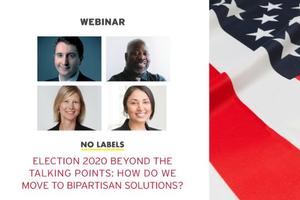On Campus
Election 2020 Beyond the Talking Points: How Do We Move to Bipartisan Solutions?

To answer the most critical problems facing society today, politicians need to come together––a seeming impossibility in the current political moment.
On October 14, faculty members from the AU School of Public Affairs discussed the challenges of bipartisanship amid pressing issues in criminal justice, education, and healthcare policy, at an online event sponsored by SPA, the Sine Institute of Policy and Politics, and No Labels, a nonpartisan group based in Washington, D.C.
Moderator Ryan Clancy, chief strategist for No Labels, said progress is difficult when political parties fail to reach consensus on a basic set of facts.
“It’s hard to agree where you are going to go as a country, if you don’t even agree where you are,” Clancy said.
On the topic of criminal justice reform, SPA Associate Professor Kareem Jordan said that while scholars agree on the definition of systemic racism, they disagree on its extent.
“You will definitely see disparity, especially among Black and Brown folks who are more likely to be arrested, convicted and incarcerated. That’s a fact,” he said. “The [conflict] is the source of that disparity. Are they offending more [often], or is it due to discrimination?”
An understanding of history is necessary to confront institutional racism and reach consensus on how to remedy it, Jordan continued. He also advocated for people to go beyond the data. Exposure to new communities and perspectives can break down walls and shrink differences.
This urgent need for consensus has been magnified by the global pandemic, said SPA Associate Professor Taryn Morrissey, whose research focuses on early childhood policy. The economic downturn has hurt low-income families and families of color disproportionately, leading to lasting impacts on food insecurity, stress, abuse, and neglect. With many private schools remaining open while public schools close, the achievement gap will likely widen, Morrissey said.
“Children are lacking safe havens of schools and peer networks. But these harms are not inevitable,” said Morrissey, calling for bipartisan action. “Our safety net has not changed despite the worst economic downturn since the Great Depression.”
For example, federal policymakers could agree on increased benefits for federal food assistance, and provide more funding to help schools open safely, with proper PPE, staff, and improved ventilation.
“This would help families across rural areas, urban areas, and [of] all political stripes. Everybody needs help now, particularly children in low-income families,” Morrissey said.
On public health issues, a growing distrust of government leaders has fueled the politicization of the COVID-19 response, said Assistant Professor Aparna Soni. While support for mask-wearing has been split along party lines, there are reassuringly high levels of faith in local health officials and employers, and both sides agree that healthcare needs to be more accessible and affordable. She anticipates possible progress on alternative payment methods, as well as increased funding to prevent and treat opioid dependencies.
“It’s great to have our ideologies and our loyalties,” Soni said. “But when it comes to science and health, being able to independently evaluate polices on their own merits, regardless of who originated them, is very important to be able to move forward and create the best policies for the country.”
Morrissey agreed that policy arguments should be based on evidence and suggested that in-person collaboration is the key to nonpartisan solutions.
“Working in person offers a different dynamic than political punditry in the media or getting on social media and simply typing something that goes out into the ether,” she said.